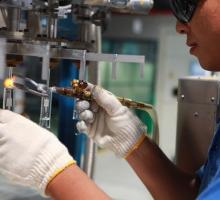What is Innovation
Innovation is the process of implementing a new idea or invention. The result of this process is to generate more added value, reduce costs or offering a new product or service to the market.
Innovation vs Invention
Innovation should not be mistaken for invention. The word invention refers to just the creation of a new idea or method. Innovation not only refers to the creation of a new idea, but also to its application in a productive process.
An invention doesn’t include the application of the new idea in a productive environment, while an innovation do has a new product or a new method of production.
Innovation vs Improvement
An innovation includes an improvement, but an improvement not necessarily is an innovation. An improvement is an incremental process that changes something that already exists, while an innovation is revolutionary.
Some examples of improvements that are not innovations are:
- Apple adds a new feature to an iPhone. The feature can be already found in another phones, but Apple decided to implement it now.
- A car manufacturer replaces humans with robots in a factory.
- An airplane manufacturer introduces better turbines into an airplane model.
By saying this, we do not mean to undervalue improvements. In fact, an improvement can result in big changes in prices and value added. At the same time, innovations can soon stop being validated by the market or even be surpassed by other innovations by the competition.
Continuous Process
Once an innovation is applied into a productive process, there is still place to keep improving. Control allow us to analyze the performance of an innovation and seek improvements or new innovations. It’s a continuous process of permanent improvement an innovation.
The Innovation Process
Idea
Innovations are born from ideas. It’s not know for sure where do ideas come from, but we can say that, in general, there are certain patterns that favor creativity and imagination.
A lot of ideas arise when people is not doing it’s main work activity, but when they are doing something else, like traveling or on leisure time. Innovative companies try to generate an environment and work schedule that allow its employees to generate new ideas and communicate it to the organization.
Ideas do not arise from nothing. New ideas are combination elements or ideas that already exist. This is why, many new ideas arise simultaneously in different parts of the world.
The emergence of a new idea can be an individual or a group process.
How to Carry Out the New Idea?
A lot of ideas stay on the road without being ever implemented. It can happens that a person has a brilliant idea, but she cannot execute it due to lack of resources:
- Material resources: many innovations require a lot of resources to be carried out. Having adequate material resources can be the key that decides if an idea will be an innovation or not.

- Human Resources: team work and work specialization is the key to the emergence and success of a lot of innovations. Many innovations are just too complex to be carried out by just one person.
– Knowledge: We are not talking about the idea per se, but about the knowledge required to carry out this idea. For example, facts about productive processes, how does the market works, where to find suppliers of specific materials, etc.
- Environment: An innovation can be a success in a country and fail in another, because of different consumer preferences, income levels, competitors, etc. Different intellectual property laws and organizations that foster innovation can make it easier to innovate in some countries.
Innovation and the Markets
Innovation, as a process, has new products and services as a result. These new products and services are demanded by the market. In the case of businesses, an innovation has a quantifiable result, like greater profits or market share.
By definition, the innovative process has a high risk. Results are uncertain, because the market can validate or not an innovation. If an innovation is not validated by the market, it means that there is not enough demand for the new product or service. Managers should take this risk into account, but also the opportunity cost of not innovating.
Summary and Conclusions
Innovation is a fundamental process inside organizations. Innovation is defined as the process of implementing new ideas, and has as a result, new products or services, greater value added or better production processes.
Innovations is different from inventions and from improvements.
When managers take innovation is a continuous process and get feedback from the results of innovation, the innovation process becomes a strength of the company.




